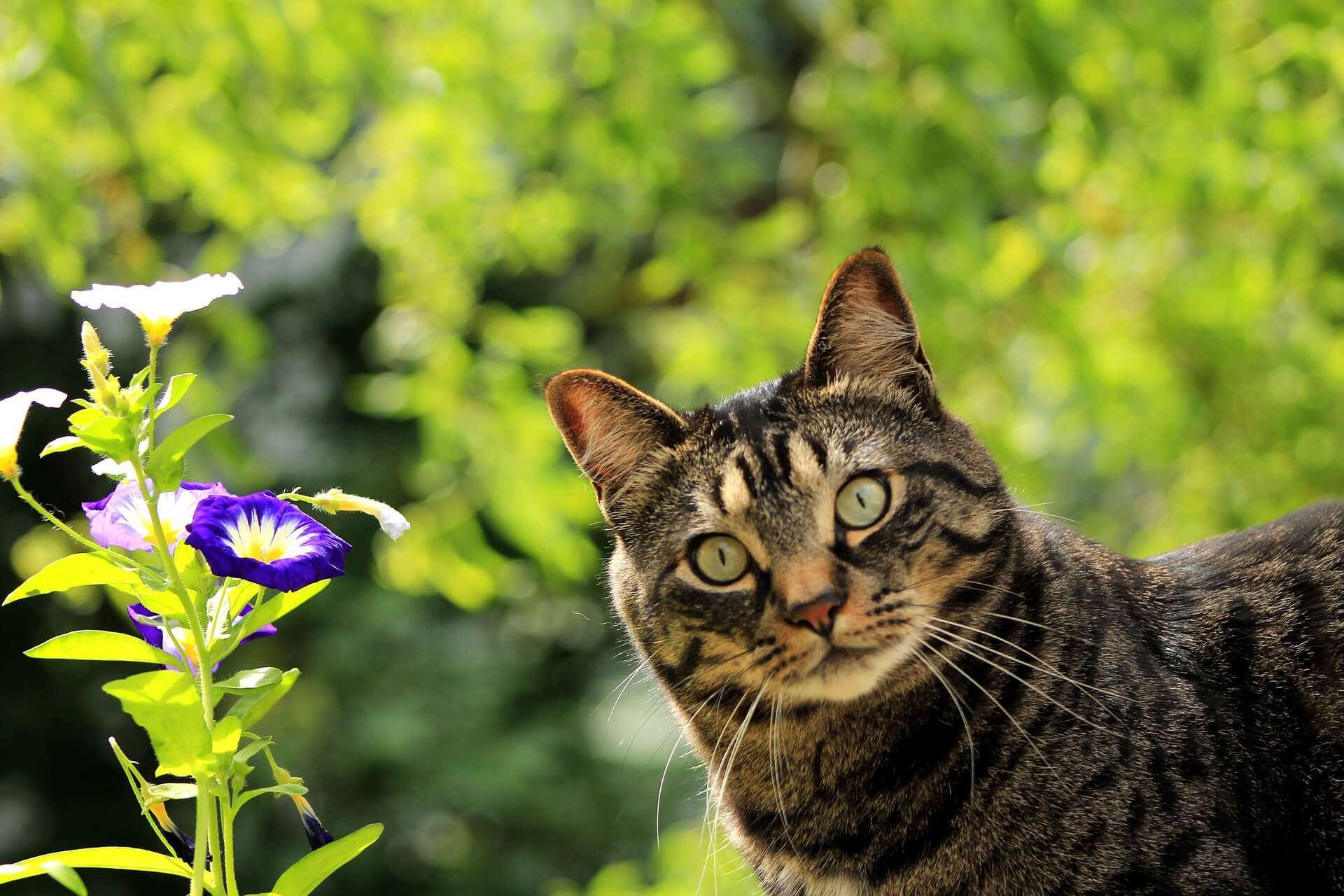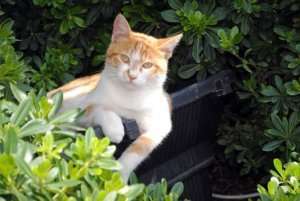
Poisonous Plants for Cats & Their Skin
Michelle at Vet Organics Tags: Allergy (8)Cats (85)date_May_2017 (8)Ivy
 Our kittens would need to eat quite a bit of ivy to cause any serious internal health problems. As far as poisonous plants for cats go, Ivy is pretty low on the toxicity scale. However, all parts of the ivy plant can cause skin irritation, rash, and even a fever. We shouldn’t leave ivy in the hard to reach places our cats like to frequent, such as shelves, tables, and book nooks. And while most of us love ivy for its trailing greenery, we can’t let the leaves drape along places our cats like to walk to walk.
Our kittens would need to eat quite a bit of ivy to cause any serious internal health problems. As far as poisonous plants for cats go, Ivy is pretty low on the toxicity scale. However, all parts of the ivy plant can cause skin irritation, rash, and even a fever. We shouldn’t leave ivy in the hard to reach places our cats like to frequent, such as shelves, tables, and book nooks. And while most of us love ivy for its trailing greenery, we can’t let the leaves drape along places our cats like to walk to walk.
 Chrysanthemums
Chrysanthemums
Chrysanthemums are pretty Spring-blooming flowers that often make it into vases on desks, tables, and bedsides. The downside? Even rubbing against the flowers can cause skin irritation. And it doesn’t matter if the flowers are on a live plant, part of a bouquet, or have died and fallen from the stalk. The sap is still present, and our cats can end up brushing the flower as they walk past or accidentally laying on a dead bloom. That pesky sap works its way to the skin and causes rashes that can be hard to detect and even harder to wash off. The same goes for dogs on this one, so keep the entire fur-family safe and comfortable by keeping these blooms out of the home and yard.
Lilies
 Lilies of all kinds are incredibly poisonous to cats. Dogs are fine, but cats can’t be around any part of a lily of any variety. Even the pollen that falls from the stamen can cause respiratory problems. When it comes to skin irritation, the dusty pollen can get everywhere, including under the hair to cause rashes, open sores, and lesions. If we pull the pollen off the plant, we still run the risk of skin problems when our kitties brush along the flowers or get too close to the leaves. Let’s avoid the risk altogether and keep these beautiful but deadly plants away from our homes, completely.
Lilies of all kinds are incredibly poisonous to cats. Dogs are fine, but cats can’t be around any part of a lily of any variety. Even the pollen that falls from the stamen can cause respiratory problems. When it comes to skin irritation, the dusty pollen can get everywhere, including under the hair to cause rashes, open sores, and lesions. If we pull the pollen off the plant, we still run the risk of skin problems when our kitties brush along the flowers or get too close to the leaves. Let’s avoid the risk altogether and keep these beautiful but deadly plants away from our homes, completely.
 Cacti & Succulents
Cacti & Succulents
The cactus is a plant that is common to many yards and landscapes, especially in regions where cacti are native to the area. Sometimes cacti become small houseplants and with the growing trend to appreciate succulents, we are seeing more and more of these plants hanging on walls, decorating tables, and sitting in window sills. The problem is, these plants often have tiny (or big) spines on them. Sometimes spines can be prickly, but we know our cats are sure-footed and can avoid most deep pricks. The problem is that most of these spines have hooks and little hairs on them that work their way underneath the hair, even when our kittens have only brushed against the spines. This can cause rashes, open sores, and even skin infections.
Primrose
 Primrose is a modestly-sized, pretty, little, potted plant that is often shared as a housewarming gift, a decorative window sill piece, or a table centerpiece. The problem is, the leaves are poisonous for our precious cats. They cause rashes, irritation, and other challenges. Primrose oil is often thought of as helpful for healthy coats, but consulting a vet is best in this scenario as well. Primrose not only causes rash and irritation, but it is considered toxic when ingested for cats and dogs, causing vomiting and diarrhea. Because our cats like to stay clean, ingestion is likely when Primrose is added to the skin as a topical.
Primrose is a modestly-sized, pretty, little, potted plant that is often shared as a housewarming gift, a decorative window sill piece, or a table centerpiece. The problem is, the leaves are poisonous for our precious cats. They cause rashes, irritation, and other challenges. Primrose oil is often thought of as helpful for healthy coats, but consulting a vet is best in this scenario as well. Primrose not only causes rash and irritation, but it is considered toxic when ingested for cats and dogs, causing vomiting and diarrhea. Because our cats like to stay clean, ingestion is likely when Primrose is added to the skin as a topical.
What to do About Poisonous Plants for Cats
 It’s common to hear people claim cats know better or can somehow instinctually know what plants are dangerous to their health.The truth is, animals are just as vulnerable as human children and need our protection from poisons and toxins. If the symptoms of poisoning ever develop, such as vomiting, call the ASPCA 24-hour emergency poison hotline directly at 1-888-426-4435. We can also call our vet for symptoms and recommendations regarding the treatment of skin lesions that may become infected or that don’t seem to get better.
It’s common to hear people claim cats know better or can somehow instinctually know what plants are dangerous to their health.The truth is, animals are just as vulnerable as human children and need our protection from poisons and toxins. If the symptoms of poisoning ever develop, such as vomiting, call the ASPCA 24-hour emergency poison hotline directly at 1-888-426-4435. We can also call our vet for symptoms and recommendations regarding the treatment of skin lesions that may become infected or that don’t seem to get better.
 Animals are just as vulnerable as human children and need our protection from poisons and toxins Also, remember that poisonous plants for cats can be a serious concern, but cats can also have seasonal skin allergies. If symptoms include itching, irritation, and agitation, but we don’t have any poisonous plants around, it could be allergies. We can also watch for behavior such as chewing on paws, disorientation, and incessant scratching. Consider EcoMange in case it’s actually mites. EcoSpot can help treat hot spots, which may seem similar to some poisonous and irritating plants. Or try EcoAllergy, an all natural anti-allergy supplement that can help cats fight skin and other allergy symptoms from the inside.
Animals are just as vulnerable as human children and need our protection from poisons and toxins Also, remember that poisonous plants for cats can be a serious concern, but cats can also have seasonal skin allergies. If symptoms include itching, irritation, and agitation, but we don’t have any poisonous plants around, it could be allergies. We can also watch for behavior such as chewing on paws, disorientation, and incessant scratching. Consider EcoMange in case it’s actually mites. EcoSpot can help treat hot spots, which may seem similar to some poisonous and irritating plants. Or try EcoAllergy, an all natural anti-allergy supplement that can help cats fight skin and other allergy symptoms from the inside.
Further Reading:
- "Top Household Hazards for Cats," WebMD
- "Toxic Hazards for Cats," VCA Animal Hospital
- "Cats and Poisonous Plants," International Cat Care
- "Poisonous Plants for Cats," petMD
- "199 Poisonous Plants," ProFlowers
